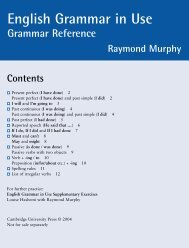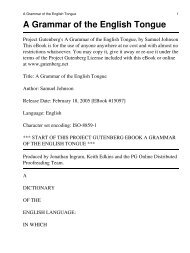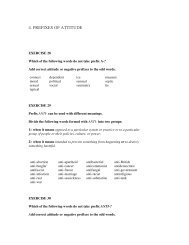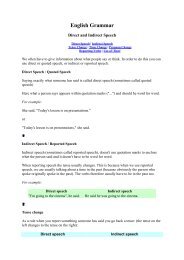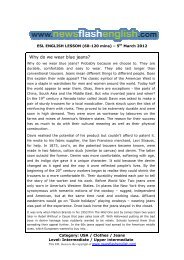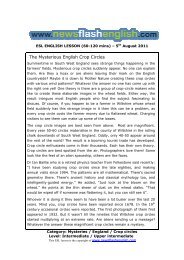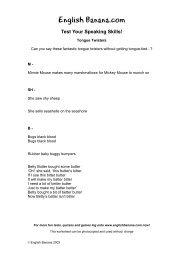TO DOWNLOAD - 75 Pages (928kb - PDF format) - ESL Teachers ...
TO DOWNLOAD - 75 Pages (928kb - PDF format) - ESL Teachers ...
TO DOWNLOAD - 75 Pages (928kb - PDF format) - ESL Teachers ...
Create successful ePaper yourself
Turn your PDF publications into a flip-book with our unique Google optimized e-Paper software.
GRAM1. InfinitivesAn infinitive is ordinarily preceded by to and is used as anoun, an adjective, or an adverb.NOUN:To err is human. (Subject}ADJECTIVE:The survivors had little to celebrate. {To celebratemodifies the noun little.]ADVERB:To please his children, Jerry bought a new pool.[To please modifies the verb bought.)Sometimes, infinitives omit the word to.EXAMPLES:Who dares [to] challenge a champion?Please [to] go.Make him [to] turn on the radio.We saw him [to] leave.2. GerundsBecause both gerunds and participles have an -ing ending,they can be harder to distinguish between. However,a sentence that equates the two presents an error in parallelstructure. If you understand the function of each in thesentence, you will be sure to spot this error.A gerund always ends in -ing and functions as a noun.SUBJECT:Writing is very rewarding.SUBJECTIVE COMPLEMENT:My favorite occupation is binding books.DIRECT OBJECT:He now regrets resigning.OBJECT OF PREPOSITION:After sealing the letter, he went For a walk.3. ParticiplesA participle acts as an adjective in die sentence.EXAMPLES:Growling threateningly, the gorilla intimidated thecrowd. (Growling modifies gorilla.)The floor invaded by termites was made of oak.(Invaded modifies floor.)There are two forms of participles, present and past,Present participles end in -ing; past participles assumemany different forms (e.g., bought, granted, shown,heard, hung, hidden, shot, torn).Also see Phrases 20F and Dangling Constructions 12E.IIM Passive voiceOther verb forms that may give trouble are the progressiveand the passive. Progressive verb forms are regularaction words that emphasize continuing action: "I amrunning" rather than "I run" Passive verbs transform thesentence in such a way that the subject is receiving actioninstead of performing it: "I was given" instead of "Igave."Note the similarities of form in the following groups.VERBS:Simple—I hit the clay target fifty times.Progressive—I am hitting the ball better than ever,Passive—I was hit by a snowball.VERBALS:Infinitive—To hit a child is considered criminal.Gerund—Hitting golf balls at a driving range isessential preparation for a match.Participle—The man hitting the ball is also thecoach.12 MODIFIERS12A Adjectives and adverbsThe purpose of adjectives and adverbs is to describe,limit, color—in other words, to modify other words.Adjectives modify nouns or pronouns, and generally precedethe words they modify. Adverbs describe verbs,adjectives or other adverbs. Some words can be used aseither adjectives (He has an early appointment) oradverbs (He arrived early).ADJECTIVES:fuzzy peachimpressive viewsour milkADVERBS:He grumbled loudly.She smiled broadly.It poured unmercifully.Although most adverbs end in -ly, some do not {fast,hard, long, straight). A few adjectives also have an -lyending (lovely day, lively discussion).12B AdjectivesProblems that students face with adjectives frequentlyrelate to the use of degrees of comparison. There arethree degrees: the positive—the original form of the word(straight); the comparative—used to compare two personsor things (straighter); and the superlative—used tocompare more than two persons or things (straightest). Ifnot understood, the spelling and form changes involvedcan sometimes confuse the unwary student,1. Most adjectives form the comparative and superlativedegrees by adding -er and -est:POSITIVE:nice22




